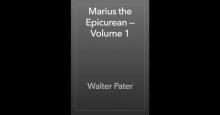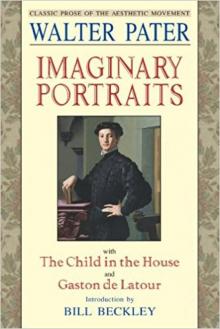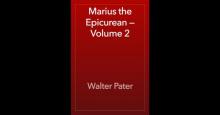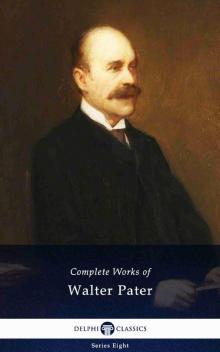- Home
- Walter Pater
Marius the Epicurean — Volume 2 Page 4
Marius the Epicurean — Volume 2 Read online
Page 4
CHAPTER XVIII: "THE CEREMONY OF THE DART"
[41] THE ideas of Stoicism, so precious to Marcus Aurelius, ideas oflarge generalisation, have sometimes induced, in those over whoseintellects they have had real power, a coldness of heart. It was thedistinction of Aurelius that he was able to harmonise them with thekindness, one might almost say the amenities, of a humourist, as alsowith the popular religion and its many gods. Those vasty conceptionsof the later Greek philosophy had in them, in truth, the germ of a sortof austerely opinionative "natural theology," and how often has thatled to religious dryness--a hard contempt of everything in religion,which touches the senses, or charms the fancy, or really concerns theaffections. Aurelius had made his own the secret of passing,naturally, and with no violence to his thought, to and fro, between therichly coloured and romantic religion of those old gods who had stillbeen human beings, and a very abstract speculation upon the impassive,[42] universal soul--that circle whose centre is everywhere, thecircumference nowhere--of which a series of purely logical necessitieshad evolved the formula. As in many another instance, thosetraditional pieties of the place and the hour had been derived by himfrom his mother:--para tes metros to theosebes.+ Purified, as all suchreligion of concrete time and place needs to be, by frequentconfronting with the ideal of godhead as revealed to that innatereligious sense in the possession of which Aurelius differed from thepeople around him, it was the ground of many a sociability with theirsimpler souls, and for himself, certainly, a consolation, whenever thewings of his own soul flagged in the trying atmosphere of purelyintellectual vision. A host of companions, guides, helpers, about himfrom of old time, "the very court and company of heaven," objects forhim of personal reverence and affection--the supposed presence of theancient popular gods determined the character of much of his dailylife, and might prove the last stay of human nature at its weakest."In every time and place," he had said, "it rests with thyself to usethe event of the hour religiously: at all seasons worship the gods."And when he said "Worship the gods!" he did it, as strenuously aseverything else.
Yet here again, how often must he have experienced disillusion, or evensome revolt of [43] feeling, at that contact with coarser natures towhich his religious conclusions exposed him. At the beginning of theyear one hundred and seventy-three public anxiety was as great as ever;and as before it brought people's superstition into unreserved play.For seven days the images of the old gods, and some of the graver newones, lay solemnly exposed in the open air, arrayed in all theirornaments, each in his separate resting-place, amid lights and burningincense, while the crowd, following the imperial example, daily visitedthem, with offerings of flowers to this or that particular divinity,according to the devotion of each.
But supplementing these older official observances, the very wildestgods had their share of worship,--strange creatures with strangesecrets startled abroad into open daylight. The delirious sort ofreligion of which Marius was a spectator in the streets of Rome, duringthe seven days of the Lectisternium, reminded him now and again of anobservation of Apuleius: it was "as if the presence of the gods did notdo men good, but disordered or weakened them." Some jaded women offashion, especially, found in certain oriental devotions, at oncerelief for their religiously tearful souls and an opportunity forpersonal display; preferring this or that "mystery," chiefly becausethe attire required in it was suitable to their peculiar manner ofbeauty. And one morning Marius [44] encountered an extraordinarycrimson object, borne in a litter through an excited crowd--the famouscourtesan Benedicta, still fresh from the bath of blood, to which shehad submitted herself, sitting below the scaffold where the victimsprovided for that purpose were slaughtered by the priests. Even on thelast day of the solemnity, when the emperor himself performed one ofthe oldest ceremonies of the Roman religion, this fantastic piety hadasserted itself. There were victims enough certainly, brought from thechoice pastures of the Sabine mountains, and conducted around the citythey were to die for, in almost continuous procession, covered withflowers and well-nigh worried to death before the time by the crowds ofpeople superstitiously pressing to touch them. But certainold-fashioned Romans, in these exceptional circumstances, demandedsomething more than this, in the way of a human sacrifice after theancient pattern; as when, not so long since, some Greeks or Gauls hadbeen buried alive in the Forum. At least, human blood should be shed;and it was through a wild multitude of fanatics, cutting their fleshwith knives and whips and licking up ardently the crimson stream, thatthe emperor repaired to the temple of Bellona, and in solemn symbolicact cast the bloodstained spear, or "dart," carefully preserved there,towards the enemy's country-- [45] towards that unknown world of Germanhomes, still warm, as some believed under the faint northern twilight,with those innocent affections of which Romans had lost the sense. Andthis at least was clear, amid all doubts of abstract right or wrong oneither side, that the ruin of those homes was involved in what Aureliuswas then preparing for, with,--Yes! the gods be thanked for thatachievement of an invigorating philosophy!--almost with a light heart.
For, in truth, that departure, really so difficult to him, for whichMarcus Aurelius had needed to brace himself so strenuously, came totest the power of a long-studied theory of practice; and it was thedevelopment of this theory--a theoria, literally--a view, an intuition,of the most important facts, and still more important possibilities,concerning man in the world, that Marius now discovered, almost as ifby accident, below the dry surface of the manuscripts entrusted to him.The great purple rolls contained, first of all, statistics, a generalhistorical account of the writer's own time, and an exact diary; allalike, though in three different degrees of nearness to the writer'sown personal experience, laborious, formal, self-suppressing. This wasfor the instruction of the public; and part of it has, perhaps, foundits way into the Augustan Histories. But it was for the especialguidance of his son Commodus that he had permitted himself to breakout, here [46] and there, into reflections upon what was passing, intoconversations with the reader. And then, as though he were put off hisguard in this way, there had escaped into the heavy matter-of-fact, ofwhich the main portion was composed, morsels of his conversation withhimself. It was the romance of a soul (to be traced only in hints,wayside notes, quotations from older masters), as it were in lifelong,and often baffled search after some vanished or elusive golden fleece,or Hesperidean fruit-trees, or some mysterious light of doctrine, everretreating before him. A man, he had seemed to Marius from the first,of two lives, as we say. Of what nature, he had sometimes wondered, onthe day, for instance, when he had interrupted the emperor's musings inthe empty palace, might be that placid inward guest or inhabitant, whofrom amid the pre-occupations of the man of practical affairs lookedout, as if surprised, at the things and faces around. Here, then,under the tame surface of what was meant for a life of business, Mariusdiscovered, welcoming a brother, the spontaneous self-revelation of asoul as delicate as his own,--a soul for which conversation with itselfwas a necessity of existence. Marius, indeed, had always suspectedthat the sense of such necessity was a peculiarity of his. But here,certainly, was another, in this respect like himself; and again heseemed to detect the advent of some [47] new or changed spirit into theworld, mystic, inward, hardly to be satisfied with that wholly externaland objective habit of life, which had been sufficient for the oldclassic soul. His purely literary curiosity was greatly stimulated bythis example of a book of self-portraiture. It was in fact the positionof the modern essayist,--creature of efforts rather than ofachievements, in the matter of apprehending truth, but at leastconscious of lights by the way, which he must needs record,acknowledge. What seemed to underlie that position was the desire tomake the most of every experience that might come, outwardly or fromwithin: to perpetuate, to display, what was so fleeting, in a kind ofinstinctive, pathetic protest against the imperial writer's owntheory--that theory of the "perpetual flux" of all things--to Mariushimself, so plausible from of old.
There was, besides, a special moral or doctrinal significance in themaking of such conversation with one's self at all. The Logos, thereasonable spark, in man, is common to him with the gods--koinos autopros tous theous+--cum diis communis. That might seem but the truismof a certain school of philosophy; but in Aurelius was clearly anoriginal and lively apprehension. There could be no inwardconversation with one's self such as this, unless there were indeedsome one else, aware of our actual thoughts and feelings, pleased ordispleased at [48] one's disposition of one's self. Cornelius Frontotoo could enounce that theory of the reasonable community between menand God, in many different ways. But then, he was a cheerful man, andAurelius a singularly sad one; and what to Fronto was but a doctrine,or a motive of mere rhetoric, was to the other a consolation. He walksand talks, for a spiritual refreshment lacking which he would faint bythe way, with what to the learned professor is but matter ofphilosophic eloquence.
In performing his public religious functions Marcus Aurelius had everseemed like one who took part in some great process, a great thingreally done, with more than the actually visible assistants about him.Here, in these manuscripts, in a hundred marginal flowers of thought orlanguage, in happy new phrases of his own like the impromptus of anactual conversation, in quotations from other older masters of theinward life, taking new significance from the chances of suchintercourse, was the record of his communion with that eternal reason,which was also his own proper self, with the divine companion, whosetabernacle was in the intelligence of men--the journal of his dailycommerce with that.
Chance: or Providence! Chance: or Wisdom, one with nature and man,reaching from end to end, through all time and all existence, orderlydisposing all things, according to [49] fixed periods, as he describesit, in terms very like certain well-known words of the book ofWisdom:--those are the "fenced opposites" of the speculative dilemma,the tragic embarras, of which Aurelius cannot too often remind himselfas the summary of man's situation in the world. If there be, however,a provident soul like this "behind the veil," truly, even to him, evenin the most intimate of those conversations, it has never yet spokenwith any quite irresistible assertion of its presence. Yet one'schoice in that speculative dilemma, as he has found it, is on the wholea matter of will.--"'Tis in thy power," here too, again, "to think asthou wilt." For his part he has asserted his will, and has the courageof his opinion. "To the better of two things, if thou findest that,turn with thy whole heart: eat and drink ever of the best before thee.""Wisdom," says that other disciple of the Sapiential philosophy, "hathmingled Her wine, she hath also prepared Herself a table." Tou aristouapolaue:+ "Partake ever of Her best!" And what Marius, peeping nowvery closely upon the intimacies of that singular mind, found a thingactually pathetic and affecting, was the manner of the writer's bearingas in the presence of this supposed guest; so elusive, so jealous ofany palpable manifestation of himself, so taxing to one's faith, neverallowing one to lean frankly upon him and feel wholly at rest. Only,he [50] would do his part, at least, in maintaining the constantfitness, the sweetness and quiet, of the guest-chamber. Seeming to varywith the intellectual fortune of the hour, from the plainest account ofexperience, to a sheer fantasy, only "believed because it wasimpossible," that one hope was, at all events, sufficient to make men'scommon pleasures and their common ambition, above all their commonestvices, seem very petty indeed, too petty to know of. It bred in him akind of magnificence of character, in the old Greek sense of the term;a temper incompatible with any merely plausible advocacy of hisconvictions, or merely superficial thoughts about anything whatever, ortalk about other people, or speculation as to what was passing in theirso visibly little souls, or much talking of any kind, however clever orgraceful. A soul thus disposed had "already entered into the betterlife":--was indeed in some sort "a priest, a minister of the gods."Hence his constant "recollection"; a close watching of his soul, of akind almost unique in the ancient world.--Before all things examineinto thyself: strive to be at home with thyself!--Marius, a sympatheticwitness of all this, might almost seem to have had a foresight ofmonasticism itself in the prophetic future. With this mystic companionhe had gone a step onward out of the merely objective pagan existence.Here was already a master in that craft of self-direction, which wasabout to [51] play so large a part in the forming of human mind, underthe sanction of the Christian church.
Yet it was in truth a somewhat melancholy service, a service on whichone must needs move about, solemn, serious, depressed, with the hushedfootsteps of those who move about the house where a dead body is lying.Such was the impression which occurred to Marius again and again as heread, with a growing sense of some profound dissidence from his author.By certain quite traceable links of association he was reminded, inspite of the moral beauty of the philosophic emperor's ideas, how hehad sat, essentially unconcerned, at the public shows. For, actually,his contemplations had made him of a sad heart, inducing in him thatmelancholy--Tristitia--which even the monastic moralists have held tobe of the nature of deadly sin, akin to the sin of Desidia orInactivity. Resignation, a sombre resignation, a sad heart, patientbearing of the burden of a sad heart:--Yes! this belonged doubtless tothe situation of an honest thinker upon the world. Only, in this casethere seemed to be too much of a complacent acquiescence in the worldas it is. And there could be no true Theodice in that; no realaccommodation of the world as it is, to the divine pattern of theLogos, the eternal reason, over against it. It amounted to a toleranceof evil.
The soul of good, though it moveth upon a way thou canst but little understand, yet prospereth on the journey:
[52] If thou sufferest nothing contrary to nature, there can be nought of evil with thee therein.
If thou hast done aught in harmony with that reason in which men are communicant with the gods, there also can be nothing of evil with thee--nothing to be afraid of:
Whatever is, is right; as from the hand of one dispensing to every man according to his desert:
If reason fulfil its part in things, what more dost thou require?
Dost thou take it ill that thy stature is but of four cubits?
That which happeneth to each of us is for the profit of the whole.
The profit of the whole,--that was sufficient!+
--Links, in a train of thought really generous! of which, nevertheless,the forced and yet facile optimism, refusing to see evil anywhere,might lack, after all, the secret of genuine cheerfulness. It left intruth a weight upon the spirits; and with that weight unlifted, therecould be no real justification of the ways of Heaven to man. "Letthine air be cheerful," he had said; and, with an effort, did himselfat times attain to that serenity of aspect, which surely ought toaccompany, as their outward flower and favour, hopeful assumptions likethose. Still, what in Aurelius was but a passing expression, was withCornelius (Marius could but note the contrast) nature, and a veritablephysiognomy. With Cornelius, in fact, it was nothing less than the joywhich Dante apprehended in the blessed spirits of the perfect, theoutward semblance of which, like a reflex of physical light upon humanfaces from "the land which is very far off," we may trace from Giottoonward to its consummation in the work of Raphael--the serenity, the[53] durable cheerfulness, of those who have been indeed delivered fromdeath, and of which the utmost degree of that famed "blitheness "of theGreeks had been but a transitory gleam, as in careless and whollysuperficial youth. And yet, in Cornelius, it was certainly united withthe bold recognition of evil as a fact in the world; real as an achingin the head or heart, which one instinctively desires to have cured; anenemy with whom no terms could be made, visible, hatefully visible, ina thousand forms--the apparent waste of men's gifts in an early, oreven in a late grave; the death, as such, of men, and even of animals;the disease and pain of the body.
And there was another point of dissidence between Aurelius and hisreader.--The philosophic emperor was a despiser of the body. Since itis "the peculiar privilege of reason to move within herself, and to beproof against corporeal impressions, suffering neither sensation norpassion to break in upon her," it follows that the true interest of thespirit must ever be to treat the body--Well! as a corpse attachedthereto, rather than as a living companion--nay, actually to promoteits dissolution. In counterpoise to the inhumanity of this, presentingitself to the young reader as nothing less than a sin against nature,the very person of Cornelius was nothing less than a sanction of thatreverent delight Marius had always had in the visible body of man.Such delight indeed had been but [54] a natural consequence of thesensuous or materialistic character of the philosophy of his choice.Now to Cornelius the body of man was unmistakeably, as a later seerterms it, the one true temple in the world; or rather itself the properobject of worship, of a sacred service, in which the very finest goldmight have its seemliness and due symbolic use:--Ah! and of whatawe-stricken pity also, in its dejection, in the perishing gray bonesof a poor man's grave!
Some flaw of vision, thought Marius, must be involved in thephilosopher's contempt for it--some diseased point of thought, or moraldulness, leading logically to what seemed to him the strangest of allthe emperor's inhumanities, the temper of the suicide; for which therewas just then, indeed, a sort of mania in the world. "'Tis part of thebusiness of life," he read, "to lose it handsomely." On due occasion,"one might give life the slip." The moral or mental powers might failone; and then it were a fair question, precisely, whether the time fortaking leave was not come:--"Thou canst leave this prison when thouwilt. Go forth boldly!" Just there, in the bare capacity to entertainsuch question at all, there was what Marius, with a soul which mustalways leap up in loyal gratitude for mere physical sunshine, touchinghim as it touched the flies in the air, could not away with. There,surely, was a sign of some crookedness in the natural power ofapprehension. It was the [55] attitude, the melancholy intellectualattitude, of one who might be greatly mistaken in things--who mightmake the greatest of mistakes.
A heart that could forget itself in the misfortune, or even in theweakness of others:--of this Marius had certainly found the trace, as aconfidant of the emperor's conversations with himself, in spite ofthose jarring inhumanities, of that pretension to a stoicalindifference, and the many difficulties of his manner of writing. Hefound it again not long afterwards, in still stronger evidence, in thisway. As he read one morning early, there slipped from the rolls ofmanuscript a sealed letter with the emperor's superscription, whichmight well be of importance, and he felt bound to deliver it at once inperson; Aurelius being then absent from Rome in one of his favouriteretreats, at Praeneste, taking a few days of quiet with his youngchildren, before his departure for the war. A whole day passed asMarius crossed the Campagna on horseback, pleased by the random autumnlights bringing out in the distance the sheep at pasture, the shepherdsin their picturesque dress, the golden elms, tower and villa; and itwas after dark that he mounted the steep street of the little hill-townto the imperial residence. He was struck by an odd mixture ofstillness and excitement about the place. Lights burned at thewindows. It seemed that numerous visitors were within, for thecourtyard was crowded with litters and horses [56] in waiting. For themoment, indeed, all larger cares, even the cares of war, of late soheavy a pressure, had been forgotten in what was passing with thelittle Annius Verus; who for his part had forgotten his toys, lying allday across the knees of his mother, as a mere child's ear-ache grewrapidly to alarming sickness with great and manifest agony, onlysuspended a little, from time to time, when from very weariness hepassed into a few moments of unconsciousness. The country surgeoncalled in, had removed the imposthume with the knife. There had been agreat effort to bear this operation, for the terrified child, hardlypersuaded to submit himself, when his pain was at its worst, and evenmore for the parents. At length, amid a company of pupils pressing inwith him, as the custom was, to watch the proceedings in the sick-room,the eminent Galen had arrived, only to pronounce the thing done visiblyuseless, the patient falling now into longer intervals of delirium.And thus, thrust on one side by the crowd of departing visitors, Mariuswas forced into the privacy of a grief, the desolate face of which wentdeep into his memory, as he saw the emperor carry the child away--quiteconscious at last, but with a touching expression upon it of weaknessand defeat--pressed close to his bosom, as if he yearned just then forone thing only, to be united, to be absolutely one with it, in itsobscure distress.
NOTES
42. +Transliteration: para tes metros to theosebes. Translation:"rites deriving from [his] mother."
47. +Transliteration: koinos auto pros tous theous. Translation:"common to him together with the gods."
49. +Transliteration: Tou aristou apolaue. Translation: "[Always] takethe best."
52. +Not indented in the original.

 Marius the Epicurean — Volume 1
Marius the Epicurean — Volume 1 Imaginary Portraits
Imaginary Portraits Marius the Epicurean — Volume 2
Marius the Epicurean — Volume 2 Delphi Complete Works of Walter Pater
Delphi Complete Works of Walter Pater